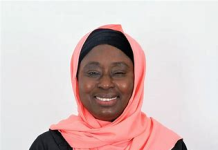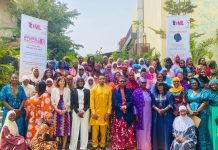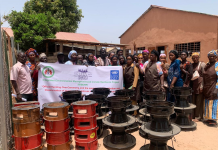GAMCOTRAP has launched a two-year project with two hundred community leaders Dr. Isatou Touray during opening ceremony and a cross section of participantsin Lower and Central districts of the North Bank Region of the Gambia. The project which is funded by the United Nations Trust Fund to end Violence Against Women (UN Women) seeks to empower communities to end FGM and promote the rights of women and girl-children. As a result community leaders and members of the Council of Elders from both districts participated in a series of workshops held in Kinteh Kunda, Njaba Kunda and Kerewan respectively. During a three day training workshops participants were sensitized about the project..
In his launching statement, the Governor of North Bank Region, Lamin Queen Jammeh, thanked and welcomed GAMCOTRAP for the initiative in his region and noted that traditional practices are strongly held in Lower and Central Baddibu but urged participants to reflect on the process of human development and the need for attitudinal change. He observed that to change attitudes there is need for modesty in order to gain knowledge and make informed decisions. He urged the participants to learn and share the information they gain from this project. Governor Jammeh appreciated GAMCOTRAP’s approach of working through local structures, while working with opinion leaders which he observed is in the right direction in order to reach success. Governor Jammeh called for sustainability of the campaign through multimedia channels such as radios and other media outlets.
He commended Kerewan community radio for its contribution in raising awareness and observed that people are responding positively towards ending Female Genital Mutilation – FGM.
He said there are positive cultural practices that need to be preserved but people should also reflect on the harmful ones. Governor Jammeh asserted that there is a global effort to recognize the positive role of women in development.
Speaking during the launching, the Chief of Lower Baddibu, Alhajie Fabala Kinteh said the objective of the gathering is to engage in dialogue in order to bring about change in perceptions and attitudes to protect the next generation of girls from FGM. Chief Kinteh challenged the religious leaders and scholars to take their responsibility to enlighten their people because a lot of people are now aware that FGM is not an Islamic practice and it has been confirmed that it is not in the Quran therefore the issue should be debated over, so as to come to consensus whether FGM is a religious practices or not. He asserted that it is part of development strategies to engage leaders as role models of their communities and he declared his support for the project in his region and affirmed his commitment to work with his people to end FGM and protect the girl-child.
Speaking at Njaba Kunda village, Chief Alhajie Jagne, said the launching of the project is important because it addresses issues that people misinterpret as religion. He said that people can no longer hide behind culture as they continue to practice FGM. Chief Alagie Jagne is optimistic that FGM will end in his district because some families have started resisting the practice and concluded that both men and women should work together to protect girl-children from FGM.
Chief Yaya Jarjusey, board member of GAMCOTRAP, asserted that through research it has been realized that FGM causes harm to women during child birth and affects female sexuality. He also reiterated the importance of working with local structures to overcome ignorance through awareness creation and knowledge sharing that contributes to human development. He urged the Village heads to share the information with their religious leaders and scholars because some countries have already enacted laws but the Gambia started with raising awareness before a law is enacted. He congratulated the two chiefs for accepting to welcome the project in their districts.
The Executive Director of GAMCOTRAP, Dr. Isatou Touray said the project goal is to provide a safer environment for girls under 18 and greater respect for the rights of women. She thanked the relevant community leaders in Lower and Central Baddibu districts for their positive response. Dr. Touray told participants that GAMCOTRAP’s mission and vision is to advocate for a better future for children and in support of government’s policies on women and children as it strives to obtain a law to prohibit FGM. She noted that the project will cover 56 villages in the two districts with a population of 38,134.
She said as we work on getting a law in place, the project will reach out to various target groups in the two districts and urged all and in particular women to take the project seriously because it is women and girls who are affected by FGM and contributes negative impact on infant and maternal mortality rates. Dr. Touray informed the gatherings the positive progress made with ex-circumcisers who have abandoned the knife and protecting girls from FGM and took note of circumcisers who cross borders to practice FGM outside their communities because people have refused to get their girls cut.
Resource persons on Islam, FGM and women’s rights, Oustass Kalipha Jammeh and Muhammad Sanuwo enlightened participants on the misconceptions that FGM is a religious practice. It was noted that the practice existed before Islam and it is not a requirement for Muslim women to fulfill their religious rites and there are Muslim women who do not practice it. Also it was noted that the prophet of Islam did not direct Muslims to practice FGM and there is no historic or religious text that shows that he directed his four daughters to perform the practice. It was emphasized that FGM is a cultural practice, not a religious injunction and it was agreed that people can change culture through awareness. The community leaders were also exposed to the rights of women and children and the effects of FGM on sexual and reproductive health.
Prepared by GAMCOTRAP
30th March 2015



















